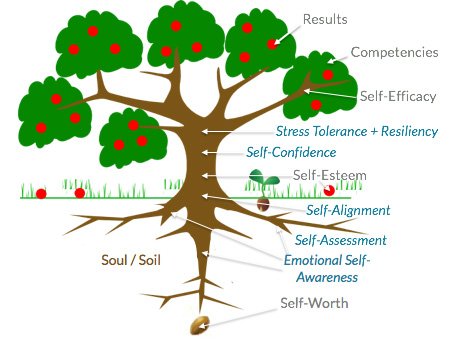

You feel afraid; full of doubt. You question. “Yes, no, maybe?” “What if I don’t make my sales numbers?” “What if they think I’m a total bore?” “What if this proposal bombs?” You wish you could own your authority, but pressing for that budget increase feels impossible. You need Self-Confidence. But how do you believe in yourself when you feel inexperienced, like a fraud, frumpy, unqualified—unable to meet demands?
“Low self-confidence isn’t a life sentence. Self-confidence can be learned, practiced and mastered—just like any other skill. Once you master it, everything in your life will change for the better.” —Barrie Davenport
What is Confidence?
Confidence comes from the Latin fidere, “to trust.” If you are a self-confident person, you believe in your all-around ability to do well. Unafraid of being a failure, you maintain and display calm assurance. Having Self-Confidence does not mean you are unrealistic about yourself or that you feel certain in all situations; but when a specific endeavor (e.g., public speaking, extreme skiing, passing an exam) stirs waves of doubt, you reach for courage. You move forward toward your desired goals—starting small, working through challenges, practicing and learning from mistakes—until courage crystallizes into confidence. True confidence—as opposed to the “show” people project to mask their insecurities—is a radical superpower.
Why Does Self-Confidence Matter?
Self-Confidence is considered one of the most influential motivators and regulators of behavior in people’s everyday lives (Bandura, 1986). “In professional occupations, those with high self-confidence earn $28,000 more than those with low Self-Confidence. And, according to the book The Confidence Code, confidence is more predictive of career success than competence” (Kay, K., & Shipman, C., 2014). When you feel trust, you can act and interact with trust. Therefore, beyond what we have within ourselves, confidence is found in what we give to others.
Self-Confidence Insights
People with less Self-Confidence tend to be cautious, quiet and unassuming. Often questioning their own abilities, they prefer to stay in their comfort zone and avoid taking risks that could lead to failure. This may stem from feelings of inadequacy, or exhaustion and fatigue. Their behaviors can appear insecure and subject to others’ opinions. Examples of this are covering up mistakes so that people won’t notice or lifting up accomplishments so that people will notice. Low Self-Confidence often manifests itself as negativity and can be self-destructive.
People with more Self-Confidence believe in themselves and win the confidence of others. They know how to fight and overcome self-doubt and are not easily swayed by someone else’s arguments. When sensing uncertainty, they trust their ability to find the resources needed for success. Genuinely confident people can admit and learn from mistakes and accept compliments graciously. Overly confident people tend to take on too much risk, stretch beyond their capabilities and crash badly. They can be so optimistic or assuming that they don’t make enough effort to truly succeed.
Establishing The Roots

Strong Self-Confidence arises from a progression of underlying factors. It originates from a core knowledge that your worth does not depend on doing worthwhile things. You are worthy from within—despite flaws, weaknesses and limitations. Self-Confidence approached from the outside-in — based wholly on goals, accomplishments and external validation — will not work.
You must start at the root, which requires weeding out entrenched negative beliefs. We all need help to find and hold fast to the source of our value, so don’t be afraid to seek support. When wholehearted acceptance becomes conscious of your feelings through Emotional Self-Awareness, you sense a capacity to grow and you are eager to engage in Self-Assessment. Through this process, you identify strengths while guarding against exhausting self-inflate; you recognize weakness while avoiding self-hate. Your Self-Alignment reflects “I am enough” together with “I can do better.” And now you are poised to establish authentic Self-Confidence.
How to Strengthen Self-Confidence
If to be self-confident is to trust in yourself, then to strengthen Self-Confidence is to become more self-trustworthy. Trust builds upon historical facts; it is based on the past, drawing upon the evidence of what we have previously heard or experienced. Below are a few strategies to help you get started.
1. Embrace Vulnerability
People who brim with Self-Confidence embrace vulnerability. It may seem counterintuitive, but exposure, uncertainty and risk make up the soil in which authentic confidence and the resultant fruit—our creativity, abilities and accomplishments grow. You will need to call upon courage to face your fears and to do something when there are no guarantees. You cannot confidently ski expert terrain unless you first agree to slip awkwardly and slide down the bunny slope.
2. Do What Scares You
You’ll never know what you’re capable of until you learn to get out of your comfort zone on a regular basis. Begin by doing small and simple tasks well and celebrating every little success. In time, stretch yourself with more significant challenges. Self-Confidence is not taught or learned from a book; you build it by exceeding your expectations. As you lean into challenging experiences, distance yourself, at least mentally, from disheartening people and associate with those who believe in and cheer you on. As you evaluate your progress, reject all toxic self-defeating thoughts.
3. Practice, Practice, Practice
In the recent Women’s Final Four game, Notre Dame’s Arike Ogunbowale made the last second game-winning shot—not once but twice. When asked about the secret to her confidence that bid teammates to get the ball into her hands, she replied: “I practice late-game all the time.” Self-Confidence relies on repeating a skill over and over until you can perform almost without second thought. Effective practice is consistent, focused, and targets content or weaknesses that lie at the edge of your current abilities. It expands your Self-Confidence like the “growth rings” of a tree. Why is purposeful practice so important? Because confidence has a direct correlation with competence.
4. Fail Forward
Failure is not fatal; and in fact, it is almost always a prerequisite for success—as long as you don’t (ironically) fail to learn from it. Failure is a part of your training. You must accept the fact that you are going to fail to gain Self-Confidence, and you need to make sure that everyone on your team understands this as well. Search for the positive side of your mistakes and setbacks. Be committed to persist—no matter what. Thomas Edison tried and failed nearly 2,000 times to develop the filament for the incandescent light bulb. When asked about it, he said, ‘I didn’t fail. I found out 2,000 ways how not to make a light bulb.’
5. Imagine the “I’m possible.”
The most powerful tool you have inside your body is your mind. Use your mind to visualize and feel your success in vivid detail. Example: Make your own “brag sheet”—a list of all the reasons you can trust yourself and think about these things. These self-affirmations will remind you of who you are and will help to combat doubt, fear and mind-games. Rather than agonize over what is not, be grateful for what is. Gratitude will fuel your Self-Confidence with the hope you need to imagine possibilities.

Confidence is an attribute you can build within yourself. Like a trunk whose function is to support the tree, Self-Confidence will stabilize, nourish and protect you. What do you want? Cultivate the power of belief within yourself and you’re halfway there. Before you know it, your unshakeable inner strength will blossom. Yes, winds of testing will come, but don’t you give up on your dreams. There are things the world would miss that only YOU can bring about. And stamped on every piece of ripening, delectable fruit is the phrase, “I’m possible!”
